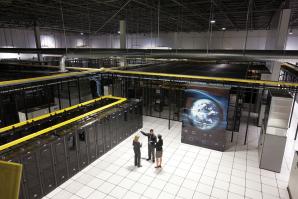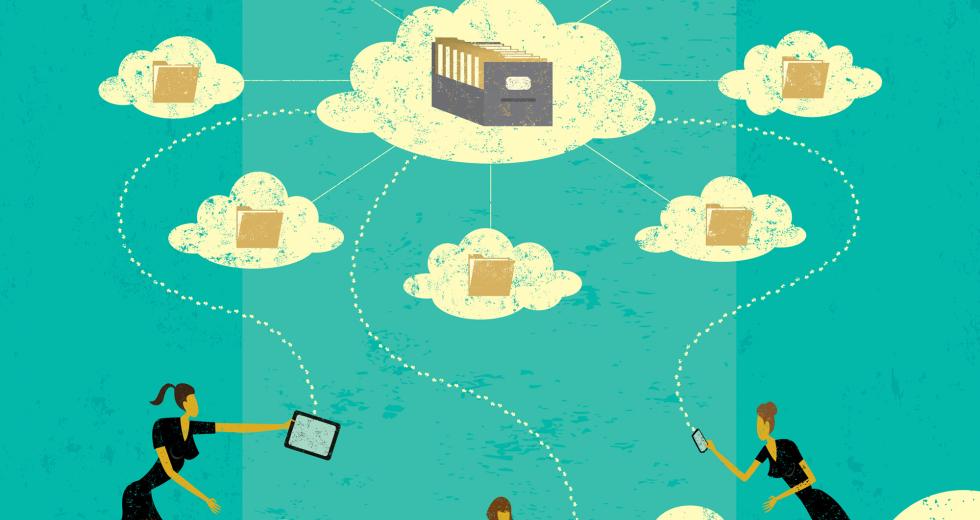Instead of sitting down to watch White Christmas or another streaming movie or TV show, Netflix online video users huddled around their television on Christmas Eve were greeted with an unfortunate message: the online content was unavailable.
The shutdown, which lasted about 12 hours and affected a share of 30 million Netflix streaming subscribers, was the result of an outage at an Amazon Web Services’ cloud computing center in Virginia. The error had to do with a technical process where computing companies shift work from computer to computer, an integral component of cloud computing.
Amazon apologized for the glitch in a statement and promised to “learn from this event and use it to drive further improvement,” but the result equated to more than a few million people missing out on such holiday classics as Santa Claus Conquers the Martians. It was the latest dustup in a long debate over the efficiency and safety of public cloud computing and raised questions as to whether the private cloud model is a better alternative.
“Cloud is a new model. Even for great data operators like Amazon … there are still changes being done to code. Could Netflix do it better on their own? It seems like a big challenge,” says Ed Anderson, a research director with Gartner Research.
Cloud computing, or Web-based computing, is a general term to describe the movement and storage of applications and services and their related data on the Web. The difference between the cloud model and the traditional hosted service is that rather than running many applications on a large, expensive computer, the cloud operates applications over many smaller and cheaper computers.
As information technology firms and departments move their data to the cloud, there is debate over security issues, with some companies preferring to establish their data on a private cloud, a proprietary network or data center that supplies hosted services to a limited number of people.
As one IT expert explained, a way to distinguish the private and public cloud is to envision data as people with various needs. A public cloud houses many people in a communal living situation where there is some privacy but also comingling; a private cloud is a house walled off from the larger community. This is alluring to some for security reasons. In a worldwide survey of 800 executives, 41 percent said they used or intended to use a private cloud, and 30 percent said they intended to use a public cloud, according to global auditor and advisory firm KPMG. Half of IT executives said security was the “most important challenge or concern.”
“In the tech world, there is a religion called security,” says George Usi, president of Sacramento Technology Group. “A lot of companies don’t trust (the public cloud) so they keep their data within the walls of their brick and mortar.”
There are some companies in industries like health care and finance that are required by the government to maintain private clouds due to privacy and security. But any company might prefer to maintain total responsibility for their data center as a way to avoid red tape.
“We all know something will go wrong at some point, regardless of whether you go public or private,” writes Dave Malcolm, chief technology officer of Surgient, in an article for NetworkWorld. “With a public solution, you’ll be dealing with both internal owners and likely multiple external owners to resolve the issue, which can result in confusion and resolution delays. With a private cloud, you own the cloud and can prioritize resolution based on the needs of your business, rather than someone else’s.”
But maintaining a data center and its related infrastructure is relatively expensive. A public cloud relinquishes that responsibility. While the data of one company is housed with the data of many others, it is important to note that it remains separate and is encrypted with a key that only select users would have access too. “If someone does break in,” says Usi from SacTech, “they will just see a bunch of garbled zeros and ones unless they have the key. So generally speaking, more technologists are saying, ‘okay its tougher to break the code.’”
Many companies dip their toes into public clouds with seasonal campaigns or other special projects that require ample storage space but are separate from the businesses’ everyday activity. These special programs present a low risk way to experiment with the public cloud.
“They feel like they have a little higher tolerance for risk, if the marketing campaign goes down for a few hours they will be upset but its not going to shut their entire business down,” says Anderson from Gartner.
Whether a company decides on a public or private cloud, there is no question that the Web is transforming the storage of data. By 2015, Gartner predicts that 10 percent of overall IT security enterprise capabilities will be delivered in the cloud.
“The biggest advantage for all business is you can focus on business instead of babysitting your technology,” says Usi. “Businesses are realizing that.”
Ready to go public? Which cloud system is right for your company?
Pros:
• Cheaper
• Greater vulnerability is debatable
• Private clouds can also have security failings
Cons:
• Security is more questionable
• Users are at the mercy of providers and their choices for standards and technology
• Additional bureaucracy; external vendors must resolve every internal issue
Experts say, use a public cloud if:
• The application is used by lots of workers, like email
• Code still needs to be tested and developed
• Your company needs to add ‘incremental capacity’ for peak times
• Your company is involved in collaborative projects • with other companies
The Private Cloud
Pros:
• Total control
• Your company is responsible for its own security
Cons:
• More expensive
• Reduced savings as company must maintain the entire infrastructure
Experts say, use a private cloud if:
• Your company must adhere to strict security and privacy issues
• Your company is large enough to run an adequate cloud data center
Source: dummies.com
Recommended For You

Cumulous Data
The opportunities and hazards of cloud computing
While most businesses are postponing investments and stashing cash, at least one expense is expected to grow this year: information technology.

Get Onto My Cloud
Moving to virtual space for software, storage and more
As a chief executive of a real estate and brokerage firm, Jason
Moulton faced some hard financial decisions in 2009.
Among the cost-saving measures Moulton implemented was to move
all operations to the clouds, or virtual, rather than physical
hardware and software.
As a chief executive of a real estate and brokerage firm, Jason Moulton faced some hard financial decisions in 2009.
Among the cost-saving measures Moulton implemented was to move all operations to the clouds, or virtual, rather than physical hardware and software.



